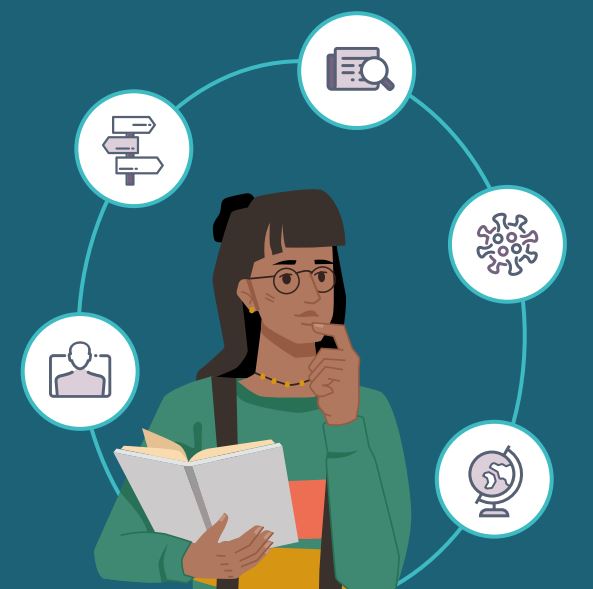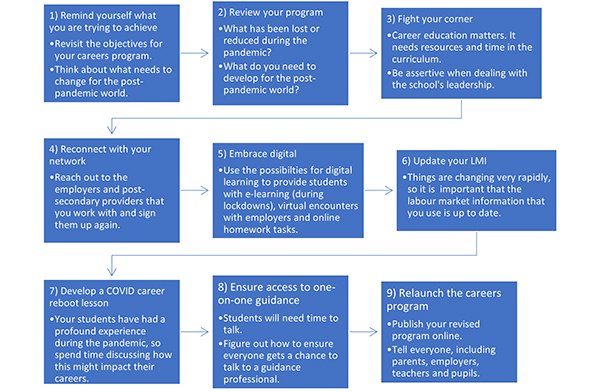Delivering Career Education in the Post-Pandemic World
27/07/2022
This blog post was authored by Professor Tristram Hooley for the myfuture Insights series. Download the full paper here.

The COVID-19 pandemic has had a profound effect on our lives and our careers. It has disrupted education, dealt a major shock to the economy and labour markets, and transformed workplaces through the rapid rise of working from home.
The way in which the pandemic has rewritten our future means that career education is more important than ever. Young people need the opportunity to investigate how the pandemic has changed their aspirations and to develop their plans for the new future that they face.
Although career education is critically important, in many schools it has been seriously disrupted over the last two years. Learning from home, the push to focus on core curriculum subjects, and challenges in organising opportunities like employer visits and work experience have all had their impact.
In these times, we need career advocates to speak up and argue that it is more important than ever to rebuild our career education programs.
How the pandemic has changed our careers
The pandemic has reordered our careers at three levels: the micro, meso and macro. These changes include how we think about ourselves and our careers, how the organisations and businesses we learn and work in operate, and how our society and the economy function.
We might summarise these impacts and how to respond to them as follows:
| Level |
|
Key Impacts |
|
Issues for Young People |
|
What You Can do to Support Young People
|
| Micro |
|
A range of psycho-social impacts on our emotions, and how we think and behave, for example, disruption of our daily routines through social distancing.
|
|
Anxiety about the future, rethinking options and values, mental health issues and the loss of social connections.
|
|
Build resilience, encourage reflection, and support the rebuilding of social connections.
|
| Meso |
|
The reorganisation of businesses and learning organisations, for example, through working from home and online learning.
|
|
Increased difficulty in transitioning to new organisations and building a social and professional network; concerns about the skills of young talent who graduated during the pandemic.
|
|
Prepare them for the changing workplace, organise interactions with employers, and talk to employers about young people’s needs.
|
| Macro |
|
Societal-wide changes to how people interact with each other and major economic disruptions, for example, a reduction in global mobility and increase in recession.
|
|
Youth unemployment and underemployment, reduced mobility, and young people being disproportionately pushed into poor quality and precarious work. |
|
Educate them about the impact of the pandemic on society and the economy, encourage active citizenship, and engage with policy makers.
|
Recognising that the pandemic has changed the experience at the micro, meso and macro levels provides us with a way to understand the changes that have occurred. Of course, these changes will manifest differently for each individual, but everyone has a better chance of managing what is happening if they have a deeper understanding of the situation. Career education can support this deeper level of understanding.
Young people may tend to focus on the micro level, recognising what they are feeling and the immediate difficulties they are facing. Encouraging them to perceive the meso and macro levels will help them to see that the pandemic is not just happening to them and that many of the challenges they are facing are not their fault and are out of their control.
This can be a good basis to build opportunities for peer learning and support and a sense that ‘we are all in this together’. Ultimately, young people need to be empowered to build their careers in difficult circumstances and to avoid blaming themselves for things that they cannot control.
Career education and the pandemic
The pandemic has been a challenging time for career education in many schools. The practical constraints imposed by lockdowns and learning from home have hit career education particularly hard as it has made engagement with post-secondary learning providers and employers much more difficult.
As schools rebuild in the aftermath of the pandemic it is critical that career education remains a key focus. While it may be tempting to double-down on academic subjects, young people are facing serious challenges in transitioning to their post-school lives and building a career.
Advocates for career programs in schools should argue that career education is a priority for the following reasons:
- Young people are anxious about their futures. Serious attempts to address mental health concerns need to include optimistic and purposeful planning for the future.
- Transitions to adulthood have been made more complex. The pandemic has muddied many of the pathways that young people can take. We need to provide help and guidance to get them back on track.
- Schools need to ensure good outcomes. Spending time supporting young people’s career goals can help to ensure that they move on to viable and appropriate destinations.
- Optimism supports motivation and engagement. Some young people may be wondering what they future holds for them. Giving them optimism will enhance their engagement with school.
To achieve this, it is important to be assertive and build a COVID recovery plan for your school’s career education program.
Nine steps to a career education recovery plan

Developing a career education recovery plan will reinvigorate and update your careers provision. The pandemic has been a powerful time of reflection for us all and could possibly cast a shadow on the education system for many years to come. It is essential that career education continues to be a top priority. Young people currently need more help than ever in building their futures.
myfuture
myfuture provides lots of resources for teachers and career practitioners to help you understand current learning and work opportunities, provide activities and lesson plans, and link to research and other professional development opportunities. You’ll also find past myfuture Insights papers and webinars.
If you’re new to myfuture, start exploring the website at www.myfuture.edu.au, and sign up to receive targeted newsletters.